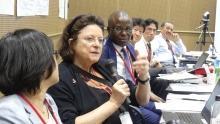2022
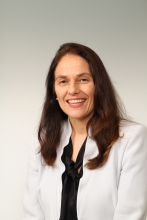
Respect for Aged Day - Director's message
Today, 19 September 2022, Japan celebrates “Respect for the Aged Day”. The Day honors and appreciates the contributions senior citizens have made to society. The WHO Centre for Health Development in Kobe (WHO Kobe Centre or WKC) is proud to be associated with this national day through Hyogo Prefecture, the origin of this honourable tradition and one of our key benefactors along with Kobe City.
Japan is world famous for its very high population of centenarians – people who are over one hundred years old. We honor them and all older people who contribute so much to our community.
Most countries in the world now face a similar challenge as Japan – a emergent older population that require integrated health and social systems that are prepared to respond to their changing needs. Integrated long-term care is essential for older persons’ wellbeing; yet, formal long-term care systems are far less developed in most countries compared to health care systems.
At WKC, we work with partners across the globe and in the Kansai region of Japan to identify factors that affect equitable access to health and social care services for older people. We draw on lessons from the Kansai region of Japan and the Asia Pacific Region more widely to inform global policy development and help national authorities to take appropriate action to address the inequities that older people face in accessing needed care. For example, as the world moves to accelerate access to Universal Health Care (UHC), WKC is advocating for monitoring frameworks and metrics that measure how well health systems are adapting to the complex health needs of older persons. For more information about our mission, read further here.
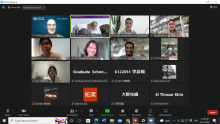
Dr Sarah Barber gave a Lecture for Juntendo University on 17th June
As a part of the Global Gerontology Course at Juntendo University organized by Dr Myo Nyein Aung, Dr Sarah L Barber gave a lecture to students about the economic implications of population ageing and long-term care on 17 June 2022. She emphasized that investments in promoting healthy ageing can have important benefits to individuals and economic returns to the community and society. The students actively engaged in discussing the challenges of convincing governments particularly in low- and middle-income settings to invest in healthy ageing and long-term care systems.
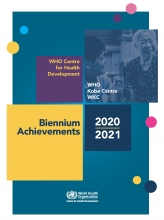
WKC’s first Biennium Achievements Report: 2020-2021
The WHO Centre for Health Development (WHO Kobe Centre – WKC) has produced an Achievements Report for the WHO biennium of January 2020 to December 2021.
The report coincides with the first two years of the COVID-19 pandemic as well as two external reviews of the Centre. It reflects WKC’s new mission and vision, and the consequent realignment of its research agenda focusing on two broad themes of universal health coverage (incorporating service delivery, sustainable financing, innovation and metrics), and health emergencies and disaster risk management.
Our work would not be possible without the support of the Kobe Group and the Hyogo and Kobe communities, and the guidance and assistance we receive from the WKC Advisory Group and the WKC Scientific Working Group.
WKC is a global research centre of excellence focusing on health systems responses to accelerate Universal Health Coverage in the context of population ageing, and health emergencies and disaster risk management.
Click here to read the report.

World Health Day 2022 - Message of Dr Sarah Barber, Director, WHO Centre for Health Development (WHO Kobe Centre)
Kobe Centre)
World Health Day on 7 April 2022 focuses on ‘Our Planet, Our Health’ and will draw global attention to the urgent actions needed to keep humans and the planet healthy and foster a movement to create societies focused on well-being.
WHO estimates that more than 13 million deaths around the world each year are due to avoidable environmental causes. The climate crisis is the single biggest health threat facing humanity. It is also a health crisis. For example:
- Over 90 per cent of people breathe unhealthy air from burning of fossil fuels.
- Extreme weather events, land degradation and water scarcity are displacing people and affecting their health.
- Pollution and plastics found in the deepest oceans and the highest mountains have found their way into our food chain.
- Cigarette butts are the most abundant form of plastic waste in the world, take years to break down and are commonly found in dead bodies of sea birds, dolphins and sea turtles.
- Commercial systems which produce ultra-processed, unhealthy foods and beverages are driving obesity, increasing cancer and heart disease while contributing to a third of greenhouse gas emissions.
The COVID-19 pandemic has highlighted vast inequities in our world. Health systems are the main line of defence for populations faced with emerging health threats, including from climate change. To protect health and avoid widening health inequities, countries must build climate-resilient health systems.
Sustainable ‘well-being societies’ are committed to achieving equitable health now and for future generations while respecting ecological limits. A well-being economy has human well-being, equity and ecological sustainability as goals which are translated into long-term investments, well-being budgets and ecological sustainability.
Breaking cycles of destruction for the planet and human health requires legislative action, corporate reform and social environments which support and encourage individuals to make healthy choices.
WHO is urging governments and the public to share stories of steps they are taking to protect the planet and their health and prioritize well-being societies.
The WHO Kobe Centre conducts research and promotes its uptake to ensure that more people will be better protected from the health impact of emergencies and disasters.
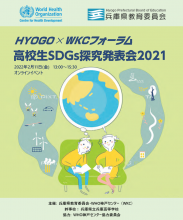
17 Hyogo high schools participate in annual WKC High School Forum
The WKC high school forum has become an annual event since it was first held in 2016. This year, on 11 February 2022, the WHO Kobe Centre organized the event in partnership with the Hyogo Prefecture Board of Education under the title, “HYOGO × WKC Forum: Inquiry-based Learning on SDGs: Presentations by high school students”. Due to the ongoing COVID-19 pandemic, the event was held virtually, as with last year. Over 200 students from 17 public high schools across Hyogo Prefecture participated from their school or from their homes.
The highlight of the first half of the programme was a keynote presentation by Dr Haruka Sakamoto, a global health expert working as a consultant for the WHO Western Pacific Regional Office for their strategy on ageing and health. Dr Sakamoto spoke about WHO’s efforts to promote progress towards SDG3, good health and wellbeing for all people at all ages, in the context of major global health trends, and shared some insights about her own career path.
In the second half of the event, four pre-selected teams of students from Hyogo High School, Nagata High School, Itami High School and Ikuno High School, respectively, gave presentations of their inquiry-based learning projects. The students analyzed current social problems, such as the digital divide affecting older people or the spread of fake news among youth and explored possible solutions. Afterwards, Mr Matthew Rooks, an Associate Professor of Kobe University, gave a brief lecture on effective communication. A panel of judges including representatives from the Hyogo Prefecture Board of Education and the WHO Kobe Centre gave the Best Presentation Award to the students from Nagata High School and an Award of Excellence to the others. The audience award for the best presentation went to a student from Hyogo High School.
The Forum concluded with a congratulatory message from Dr Sarah Louise Barber, Director of the WHO Kobe Centre.
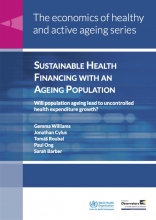
Can the costs of caring for an ageing population be controlled?
Concerns about unsustainable health spending dominate the discussion about population ageing. However, research has shown that population ageing is not a major driver of growth in health expenditure.
On 25 January 2022, Dr Sarah Louise Barber, Director of the WHO Kobe Centre (WKC), chaired a webinar by the European Observatory on Health Systems and Policies to discuss policy choices that drive health expenditures as populations age – including discussions about how health services are delivered, the prices paid for services, medicines and technologies, and volumes of care.
Speakers included Liisa-Maria Voipio-Pulkki, Ministry of Social Affairs and Health, Finland; Bridget Johnston, Trinity College Dublin, Ireland; and Gemma Williams and Jonathan Cylus, European Observatory on Health Systems and Policies, London UK.
The related WKC/EURO observatory policy briefs can be accessed here.
View the webinar here.
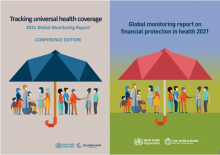
WKC research contributes to global monitoring reports on universal health coverage
The year 2021 ended on a high note as studies from the WHO Centre for Health Development (WHO Kobe Centre - WKC) were included in two flagship reports by WHO and the World Bank that track progress of the Sustainable Development Goals (SDGs) on universal health coverage (UHC).
WKC focuses, among other things, on the health systems response to accelerate UHC in the context of population ageing. Financial protection is an intrinsic part of UHC, and together with service coverage, is one of the health system’s goals.
WKC advocated for analysis by age to be included in the Global Monitoring Report on Financial Protection in Health, and the Centre’s work on analyzing financial hardship due to health care by age composition of the household formed the basis of a chapter section in the report, “Who experiences financial hardship? A focus on age” (pages 17-21).
One of the SDG indicators to monitor the dimension of financial protection is based on catastrophic expenditure, measured at the level of the household. WKC raised the importance of considering the health care needs of older people by examining the age structure of households, and provided resources for a novel analytical approach. For the first time, WHO and the World Bank did comparisons of financial protection indicators by household age structure.
The analysis results showed that households with at least one person over 60 years had the highest proportion of catastrophic expenditure, a nuanced finding that had not been revealed before.
In addition, three WKC studies were featured prominently in boxes in the report:
- “Health spending and unmet need among households with older persons in Japan” (Box 5, page 21) based on Household survey analysis of financial hardship due to excessive health spending and unmet care needs of older people in Japan with implications for the Kansai region
-
“Forgone care and financial barriers to healthcare access: A systematic review and meta-analysis” (Box 8, page 27) based on Systematic review and meta-analysis: financial barriers to accessing health services and unmet healthcare needs
-
“Composition of out-of-pocket health spending and financial coping strategies among households with older persons in Viet Nam” (Box 11, page 49) based on Measuring financial protection for older persons in Viet Nam
WKC is helping to drive the global agenda on examining unmet health care need. A further report, Tracking Universal Health Coverage: 2021 Global Monitoring Report describes WKC’s work on unmet need in adult populations based on preliminary findings from 78 low-, middle- and high-income countries using household surveys (page 13, reference 19).
Results of the analysis indicate that levels of unmet health care need tend to be lower in countries with higher values of the UHC Service Coverage Index. This suggests that better service coverage would lead to reductions in unmet care needs, and conversely, addressing unmet health care needs would improve levels of service coverage.
This global research is highly relevant to the Kansai region. WKC’s work on unmet care needs is continuing with an application to the Kansai region in partnership with several institutions including Kyoto University, Osaka University and Konan University. Two complimentary studies are being carried out. One study, mentioned earlier as one of the studies featured in the Global Monitoring Report on Financial Protection in Health, involves statistical analysis of existing household surveys to examine financial hardship due to excessive health spending and unmet care needs of older people. The other study will gather information from medical social workers to identify barriers to effective implementation of financial protection policies for older people in need of health care. Results from both studies can help identify possible gaps in service coverage and financial protection for older citizens, as well as offer insights about how existing local programs and policies could be implemented more effectively to mitigate financial hardship of older citizens due to health spending in Kansai. The findings can also feed into the next global monitoring reports to be published in 2023.
2021
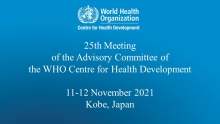
Advisory Committee congratulates WHO Kobe Centre on impressive results
The Advisory Committee of the WHO Centre for Development in Kobe (WHO Kobe Centre - WKC) has commended the Centre for impressive progress in its research portfolio and local engagement, and excellent research achievements in the thematic areas of universal health coverage and health emergencies and disaster risk management. The 25th annual meeting was held online on 11-12 November 2021.
The Director-General of WHO appoints the Advisory Committee which comprises representatives from each of the six WHO Regions, the host country, the local area, and the Kobe Group.[1] The Kobe Group provides generous material and financial support to the work of WKC.
This year, WKC Director Dr Sarah Barber welcomed three new Advisory Committee members: Mr Yasutaka Katayama, Vice Governor of Hyogo Prefectural Government representing the Kobe Group; Dr Hajime Inoue, Assistant Minister for Global Health and Welfare in the Ministry of Health, Labour and Welfare (MoHLW), representing the host government; and Professor Reiko Sakashita, Vice President of the University of Hyogo representing the local community.
The Governor of Hyogo Prefecture, Honorable Motohiko Saito, expressed his gratitude to the WHO Centre for Health Development for providing evidence-based information on COVID-19 to the Prefecture and community. He was reassured that the Centre was working on ageing and dementia, given the urgent need in Japan to reform social systems in areas such as medical and long-term care and pensions.
Dr Inoue expressed his appreciation for the efforts of the Kobe Group and others in supporting the work of the WHO Kobe Centre over the past 25 years. The Ministry of Health, Labour and Welfare assured its support to WKC in its future action and work.
Dr Viroj Tangcharoensathien, Secretary General of the International Health Policy Program Foundation in the Ministry of Public Health, Thailand, said: “WKC’s work aligns extremely well with WHO’s 13th General Programme of Work (GPW13), which strengthens collaboration with WHO Headquarters and regional offices, particularly the European and Western Pacific Regions".
One such collaboration was with the European Observatory on Health Systems and Policies to develop a very practical, innovative tool, the Population Ageing financial Sustainability gap for Health systems (PASH) Simulator.
Professor Maged Al- Sherbiny, Higher Education Senior Advisor, Direct Aid International, Kuwait commented: “I fell in love with the PASH simulator which allows policymakers to see how both health expenditures and revenues are expected to change due to changes in population aging. It supports the finding that how population ageing affects health financing is a policy choice. I hope we can disseminate this message clearly to policymakers.”
[1] The Kobe Group comprises the Hyogo Prefectural Government, Kobe City, the Kobe Chamber of Commerce and Industry, and Kobe Steel Ltd.
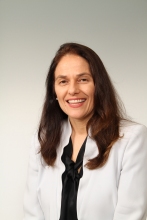
2021 UHC Day Message of Dr Sarah Barber, WHO Kobe Centre Director
This year on 12 December, the world will celebrate Universal Health Coverage (UHC) Day to raise awareness for the need for strong, equitable and resilient health systems and universal health coverage. UHC advocates for everyone, everywhere to have access to quality essential health services without suffering financial hardship.
This year’s theme is Leave no one’s health behind: invest in health systems for all. At the WHO Kobe Centre (WKC), much of our research focuses on this goal, providing evidence for policymakers on financing healthcare and ensuring access to health services even while countries undergo rapid population ageing so that older people do not get left behind.
Based on WKC input, the 2021 WHO/World Bank Global Monitoring Report on Financial Protection in Health includes data on adults at older ages facing financial hardship due to health care utilization, to ensure that the needs of older adults are recognized in achieving UHC targets. Among the findings from WKC research included in this report is the result of a meta-analysis of the prevalence of foregone health care covering 56 countries which found that about 1 in 10 people forgo health care, mainly due to unaffordability. Nearly twice as many older people forgo health care compared to younger adults.
A separate WKC-supported study in Viet Nam found that, even with health insurance, older people frequently do not seek health care when they have an illness or injury, and instead do nothing or self-medicate. The findings also suggest that households with older people suffering from chronic diseases experience the most financial hardship due to health care utilization.
To contribute to our community, WKC is partnering with local researchers to understand unmet care needs among older people in the Kansai region of western Japan. Understanding the difficulties faced by older people in paying for health care services could help ensure financial protection of older people in the Kansai region with implications for other settings. We sincerely thank our local research partners, some of whom have sent us messages in support of this UHC Day.
UHC means working together for a healthier, more equitable world. We call on leaders, policymakers and people to make smart choices about investing in health systems, inclusive of the needs of all, especially older persons. #HealthForAll #UHCDay
Dr Sarah Louise Barber
Director: WHO Centre for Health Development (WHO Kobe Centre
